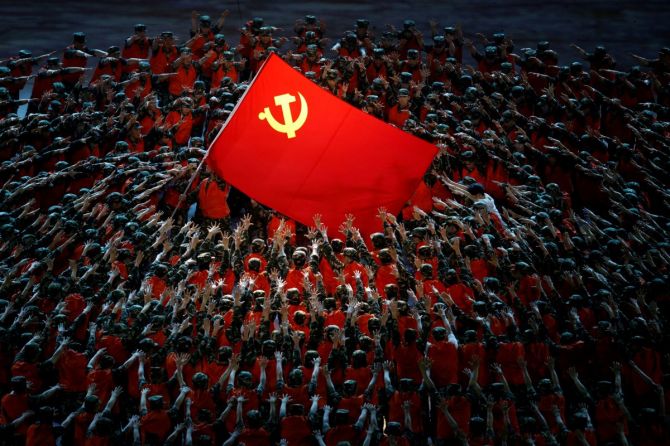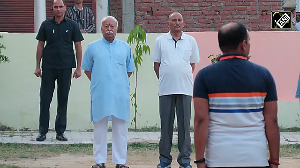With his eye on next year's Party Congress, Xi Jinping is using the CCP's centenary celebrations to publicise the benefits for China from its leadership, and boost his image and contribution to China's rise, observes Jayadeva Ranade, the distinguished China expert and retired RA&W officer.

As the Chinese Communist Party (CCP) prepares to celebrate the hundredth anniversary of its founding this year on July 1, China's newspapers and television channels are replete with articles eulogising the CCP's leadership each day.
They highlight the CCP as the world's largest Communist party which has exercised uninterrupted power for the longest period.
The hundredth anniversary is being projected as a historic event linked with the first of China's centenary goals namely the 'China Dream'.
The centenary is of special importance for the Communist party, particularly at this time when China and the CCP are under mounting pressure from the West.
The CCP leadership is using the centenary celebrations to extol the Communist party's contribution to the transformation that China has undergone since its founding.
They have publicised the betterment in people's livelihoods, the exponential growth in China's GDP, pointed to China's position as the world leader in manufacturing, the major advances in space technology, and its considerable international influence.
The launch of the Tianhe space station was timed to coincide with the centenary year.
Underscoring China's global ambitions is the Chinese media's noticeable emphasis on China's status as a leading world power and the 'superiority' of China's governance model compared to the world's democracies, as demonstrated in its handling of the coronavirus pandemic.
The modernisation and fast growing capabilities of the People's Liberation Army are prominently advertised with the rider that it is because of 'the Party's absolute leadership over the army'.
The achievements are all attributed to the CCP's leadership with Chinese President Xi Jinping at the 'core of the leadership'.
Controlling the narrative has always been very important to the CCP.
Its Propaganda Department even has the authority to excise portions of a speech made by a leader.
Carefully selected, ideologically conservative, Politburo Standing Committee (PBSC) members are normally in charge.
None of the publicity, therefore, mentions the catastrophic disasters that the CCP perpetrated in the thirty years since the founding of the People's Republic of China.
The Great Leap Forward -- which resulted in a devastating nationwide famine killing more than an estimated 40 million people -- and the decade-long Cultural Revolution where another approximately 20 million people were killed, disabled or scarred permanently, have not been mentioned.
Neither are campaigns like 'Let a Hundred Flowers Bloom', when thousands of intellectuals, academics, journalists etc were persecuted.
On April 13, the CCP released a revised, new version of the Brief History of the Communist Party of China.
The CCP has been revising and issuing versions of the Communist party's history every ten years since 1991.
The revised version, predictably, endorses Xi Jinping's policies and, interestingly, glosses over Mao Zedong's role in the Cultural Revolution.
On the contrary it lauds his efforts to fight bureaucratism and corruption!
The revised new Brief History of the Communist Party of China is now the subject of a new nationwide campaign intended to ensure that Xi Jinping's image and the CCP's contributions are widely propagated.
'Study sessions' are being organised in provinces, government departments, universities, colleges, schools and the PLA.
A Central Propaganda Group for Party History Study and Education has travelled across China since April and successfully explained the 'glorious course of the Chinese Communist Party's century of struggle', its contributions to the nation and the major theoretical achievements of 'sinicized' Marxism to 22 million people! The campaign is an attempt to instil Communist party ideology among the masses and consolidate the CCP's monopoly on power.
There are, however, indications of simmering dissatisfaction below the surface.
Recent articles by PLA officers imply indiscipline by junior officers, especially the college and high school graduates.
These suggest that they lack ideological commitment and are reluctant to accept the 'Party's absolute leadership over the army'.
Possibly in view of these reports and in an attempt to boost military morale, Xi Jinping reversed the earlier decision announced this March and dozens of People's Liberation Army Air Force aircraft will now perform a flypast over Tiananmen on July 1 as part of the celebrations.
Further indication of potential discontent is the article published by the People's Daily on June 21, listing the problems that lie ahead.
Cautioning Communist party cadres that a 'high and mighty' attitude, not being attentive to people's problems and complacency would 'have serious political consequences', the author listed tasks the Communist party requires to attend to.
He pointed out that in the 'new era' the people are increasingly yearning for a better life, looking forward to better education, more stable jobs, more satisfactory income, more reliable social security, higher-level medical and health services, more comfortable living conditions, and a richer spiritual and cultural life.
They want their children growing up better, working better and living better.
These are difficult demands to meet.
On June 17, Vice Premier Liu He, a close confidant of Xi Jinping, attended the State Council Security Committee meeting convened to prevent incidents or disruptions during the celebrations.
On June 20, the Beijing municipal government announced the blockage of radio signals in certain areas on July 1 and Beijing airport elevated security.
Armed police are on the streets of Beijing and in the subway and Tiananmen Square has been closed from June 23 to July 1.
China's Vice Minister of Public Security Wang Xiaohong also very recently warned security cadres to step up 'anti-infiltration, anti-subversion, anti-secession, and the anti-terrorist struggle' and be mindful of colour revolutions.
The stringent security measures prompted Cai Xia, a former Central Party school professor critical of Xi Jinping, to tweet on June 20: 'The party is celebrating its 100th anniversary but it looks like it was preparing for a major disaster.'
'The party has guns, money, and high-tech surveillance cameras in its control. It can arrest people and ban anything whenever it wants. What are they afraid of? Is this 100th anniversary celebration a celebration or a funeral?'
With his eye on next year's Party Congress, Xi Jinping is using the CCP's centenary celebrations to publicise the benefits for China from its leadership, and boost his image and contribution to China's rise.
The attention to the PLA's modernisation and calls for vigilance against efforts of the United States to instigate 'colour revolution' will fan nationalism and the xenophobia latent among Chinese.
With the economy having slowed and US pressure mounting, the next few years will probably be difficult for China and Xi Jinping.
This could, in turn, have consequences for China's neighbours.
Jayadeva Ranade, former Additional Secretary, Cabinet Secretariat, Government of India, is the President, Centre for China Analysis and Strategy.
Feature Presentation: Aslam Hunani/Rediff.com










 © 2025
© 2025